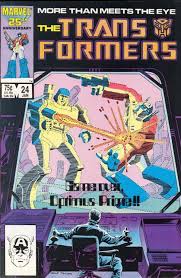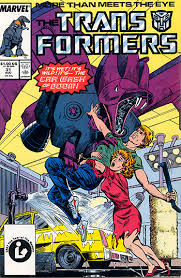“I find it hard to believe you’re as cold and heartless as your race thinks we Autobots are.”
-Skids to Donny Finkleberg, Transformers #22
I used to resent Optimus Prime.
He was too perfect. Mighty warrior. Wise philosopher. Skilled diplomat. All-around goody-two shoes.
How could anyone live up to that? And if they could, how could that kind of person even be interesting?
I was a cynical kid.
Modern Transformers comics play up the war between the Autobots and Decepticons. They also go deeper into the politics of the war--the influences that shaped it, the characters that ignited it, the way it came to be.
What they don’t do, at least not to the same extent as Budiansky did, is emphasize the practical difference between the two sides.
Autobots believe in preserving and defending life. Decepticons believe in conquering it.
Autobots will even stop in mid-battle to protect human and other lives. Avoiding human casualties proves to be the undoing of Skids in #19 (Command Performances!"). In issue #16 ("Plight of the Bumblebee!"), Bumblebee even prioritized helping humans over saving fellow Autobot Jetfire--a sharp contrast to modern Transfomers comics where Bumblebee describes the risks to three humans who are exploring the Decepticon base below as “acceptable losses” (Transformers: Infiltration, #4).
In Issue #24 ("Afterdeath!") of the 80s comic book, while conducting a battle in a video game world, Optimus Prime would rather be destroyed than put even virtual lives at risk. It’s a decision that seemed idealistic, stupid, and nonsensical at the time, especially since his suicidal adherence to his own code of conduct endangers REAL lives since he was essentially taking himself out of the picture and thus giving the Decepticons an enormous advantage.

Meanwhile, in the 2014 movie Transformers: Age of Extinction movie, Optimus Prime intends to kill the humans that are hunting Transformers.
You've come a long way, baby.
You've come a long way, baby.
Part of the change--at least in the comics-- is that the audience for Transformers comics has aged. But I also think our attitude towards civilian casualties has changed in the decades since the Transformers first came on the scene. We view them as a regrettable, but necessary part of modern war, assuming we even think of them at all.
I am so used to the current worldview that I didn’t even notice how my attitude changed until I reread the 80s comics and realized how often Budiansky’s Autobots were putting the protection of life ahead of strategic advantage.
It was…a sobering realization.
Optimus Prime’s credo is “Freedom is the Right of All Sentient Beings”…an odd amalgam of Reagan-era American jingoism (The right to be free) and the Buddhist bodhisattva vows (To liberate all sentient beings).
Red, white (okay, silver), and blue coloring aside, I like to think of Optimus as having at least one giant steel foot the latter camp. Compassion is often described as one of his core traits, which is central to Mahayana Buddhism. Enlightened beings are also credited with discernment and wisdom, which Optimus possessed in abundance (Letting himself getting blown up over a videogame notwithstanding). They are also sometimes describe as having extraordinary powers although our Autobodhisattva would be the first endowed with the ability to remake his body into the form of an eighteen-wheeler.
And of course, there is the core of the Bodhisattva vows, to remain on Earth, forsaking Nirvana for oneself until all beings are liberated from the suffering brought about by the Three Poisons. Optimus Prime also chooses to take up the mantle of Earth’s suffering, fighting to defend the planet.
If we’re going to go all-in on Transformers and Buddhist iconography, we can even make a case for each of Budiansky’s first three Decepticon leaders embodying one of the Three Poisons--Greed (power-hungry Megatron), Ignorance (Shockwave and his cold indifference), and Fear (the miserly Ratbat).
Move over Pali canon, there’s some new sutras in town. One of them is about a car wash that hypnotizes people.

Its all happening, baby.
There are things to criticize about Bob Budiansky’s Transfomers comics. Some of them were childish (Sky Lynx taking kids to a space carnival). Some of the premises were cheesy (The mind-controlling car wash, although let‘s face it, Stephen King would make hay with something like that.). And the less said about ‘Brick Springstern’ the better.
But his focus on characters’ personal stories, the way human and robot change each other, and a dedication to the natural conflict between those fighting to preserve life and those indifferent to them makes for much richer reading than one might first guess.
They might not be what we think Transformers should be about. But the storytelling is solid. And once you realize what you’re looking at, they‘re far from boring.
(*) There was a monk who got turned into a fox though. So it’s not like there isn’t SOME precedent.
No comments:
Post a Comment